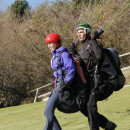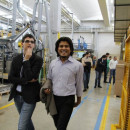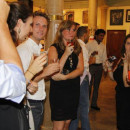Not for the Faint at Heart Past Review
By K F (Masters, Business Administration, University of Iowa) - abroad from 09/05/2011 to 07/14/2012 with
CIMBA: Paderno del Grappa - Graduate and MBA Program
I learned a lot about dealing with people from other cultures. Our class was fairly unique in that everyone was a polar opposite of everyone else; we had to work a lot harder on getting along than some previous classes, and the administration seemed to expect a game of assembling a team and excluding those whom do not see eye to eye with the rest of the class. This program is not for the faint at heart. You either need to have a serious resolve, or you need to have a want to develop a serious resolve to tackle all problems you're faced with. The program spends a lot of time focusing on self development, self regulation, etc... Unfortunately, I didn't need CIMBA to teach me how to regulate my emotions, think critically, be patient, and develop myself as a person; I've been consciously doing that for the last ten years. It's interesting to now have the science to back up my theories on self regulation and living in the present, but it was not necessary to spend my money on. I think if I had known what makes CIMBA unique going in, I would have selected a more traditional MBA program in Italy like Bocconi. The biggest thing I learned that I probably could not have gotten from any other MBA program was that I learned to stand up for myself and my values. It's a useful skill, but it was an unintentional benefit of the program that I learned just from living with 14 of the most frustrating people I have ever met. Final word: The administration downplayed my class's individualism and independence as poor team/leadership skills. I 100% disagree with any statement like this and I think we worked together very well given how different we all are. Being individualistic and unique is what makes us Human, and I would not have our class any other way. The students I attended with are all wonderful in their own right and deserve every bit of success they achieve, which I know they will.
Review Photos



Personal Information
| How much international exposure did you have prior to this program? | 6 months+ |
Review Your Program
|
* Overall educational experience
Academic rigor, intensity, resources, etc. |
This program is for people who want to go through the most change and see themselves for who they really are. The program places emphasis on leadership above all else, so if you are expecting a vacation, look elsewhere. This is no walk in the park; you will be thrown into a mind game that challenges you to balance your time among various classes, consulting projects, leadership workshops, and social obligations. |
|
* Host Country Program Administration
On-site administration of your program |
The administration plays some serious mind games. Although they promote leadership, they tend to use some strange tactics to motivate students to do what the administration wants. Sometimes they say they have a policy of no involvement, but then they appear every so often to blame students for not taking care of things. You will be expected to take initiative, and build your own extra-curricular activities. It is expected that you do everything from replacing light bulbs to setting the time on a clock, cooking food for the entire class, organizing events, and fix your own issues with other students. Their reasoning for this is that it's "your experience" and a true leader would be observant and ambitious enough to fix all the problems his/herself or organize others to help address issues and work together as a team. The web-site says that there are activities like wine tastings, but the truth is you are expected to do your own research, organize events with your class, then involve the administration when you need help. The main problem is their administrative policies are extremely ambiguous. You never really know what's your responsibility and what's not, which leaves room for you to establish your own administrative policies. Unfortunately, they never tell you what's expected of you until you have already paid the tuition and it's virtually impossible to back out of the program since you have quit your job and moved to another country. During the first month to four months, you will likely be confused, disoriented, and constantly questioning some of the administration's handling of arising situations. After that, you will either learn to love the program, or you'll be so distracted by the course load that you'll stop thinking about it entirely. |
|
* Housing:
How satisfied were you with your living arrangements? |
You are housed and have classes all in the same building. The only reason you have to leave is to get food. The miniscule gym hardly serves as an appropriate facility for fitness. There is a free weight stand, but the free weights all appear to be missing. The few weight machines are sorely outdated, sometimes a little broken, and fairly damaged in some cases. The rooms themselves have thin walls; if you are next to someone else, you will probably hear everything they do/say. It's up to you and your class to decide on rules. |
| * Food: |
There is no food; you are expected to find your own, do the shopping, and cook it. You can hire a chef, but that decision needs to be shared in cost by the entire class, and the decision has to be unanimous according to the administration. |
|
* Social & Cultural Integration:
How integrated did you feel with the local culture? |
Unless you go drinking every night (I have heard some classes with a greater number of Americans did), you will probably not be integrated very well with Italian culture or even the locals. It's a tiny town, so there aren't that many people to get to know, but that makes it easy to meet the locals. Unfortunately, you will be so busy that it will be difficult to make time too get out. There are some Italian classes, but you will have to practice with Italian students and locals to really learn the language. One student in our class studied and practiced Italian with spare time, but the others were not as interested and thus never achieved fluency. Here is the MOST IMPORTANT bit of information from my experience: You will eat, sleep, breathe, and work with the same 12-18 students the entire year. You will see their faces when you wake up and go to sleep. You will party with them, shop with them, and experience drama with them. Drama does happen, and it will happen quite often if you involve yourself. This leads |
|
* Health Care:
How well were health issues addressed during the program? |
The administration does not mess around with health conditions here and will find any way to help you ensure you are taken care of. As soon as they hear mention of sickness, they will schedule appointments and help you get to/from a doctor. |
| * Safety: |
Safety is pretty much a non-issue since Asolo is such a small, historic town. There are a couple Carabinieri officers at the nearby station, but I don't think I ever saw them outside the station. |
| If you could do it all over again would you choose the same program? |
No
|
Finances
|
* Money: How easily were you able to live on a student's budget?
(1 = not very easy/$200+ on food & personal expenses/week, 2.5 = $100/week, 5 = very easily/minimal cost) |
When it comes to American public university MBA programs, this is probably the cheapest it gets. CIMBA is not interested in earning a profit off its full-time MBA students since they serve as a test-bed for CIMBA's other for-profit services. U. - Iowa doesn't make much off the students either. If you're lucky when all is said and done, you won't spend more than $30,000 the entire ten months (Iowa included), which includes everything from transport to mini vacations. Most likely, you will probably spend around $40,000. Non-American students spend much less, particularly Italians. Many governments will sponsor their students as well, so for all the foreign students out there, this may be an excellent option. |
| * Was housing included in your program cost? | No |
| * Was food included in your program cost? | No |
| Not including program expenses, about how much money did you spend on food and other expenses each week? | $50 |
| Do you have any general money-saving tips for future study abroad participants? | Don't eat out a lot if you can help it. Listen to the Italian students for tips on which supermarkets to go to. Also, Ryanair and Volotea are your friends for getting around Europe at a very cheap price. |
Language
| * Did your program have a foreign language component? | Yes |
|
How much did the program encourage you to use the language?
0 = No encouragement, 5 = frequent encouragement to use the language |
We had classes about once a week to learn Italian, but the encouragement to use it was minimal, and the Italian students weren't all that interested in encouraging people. They were interested in correcting your grammar, and were very patient with those whom made a real effort to practice. |
| How would you rate your language skills at the beginning of the program? | Beginner |
| How would you rate your language skills at the end of the program? | Advanced |
| What was the highest level language course you had completed prior to departure? | Italian 1 |
| How many hours per day did you use the language? | |
| Do you have any tips/advice on the best ways to practice the language for future study abroad participants? | This is all on you. Practice with the Italian students as much as possible. Learn a few new words each day, use them with the Italian students, and translate what they say as often as possible. |
Other Program Information
|
* Where did you live?
Select all that apply |
|
|
* Who did you live with?
Select all that apply |
|
|
* Who did you take classes with?
Select all that apply |
|
| About how many local friends did you make that you will likely keep in touch with? |
A Look Back
| * What did you like most about the program? |
|
| * What could be improved? |
|
| * What do you know now that you wish you knew before going on this program? | We learned pretty slowly that we were expected to fix everything, and that if we didn't, we would get some nasty words from the administration, blaming us for a variety of failings. The administration should communicate their expectations of students long before the students agree to come. If the administration could, they would keep that information from students as long as possible to keep a "surprise factor" that supposedly makes leaders grow. Unfortunately, the administration fails to understand the world of Web 3.0, and the power of crowd-sourced review sites like StudyAbroad101.com. Recommendation: When all the students have arrived, start planning out your days off together as a class. Ask the administration for recommendations on company tours, and tell them what activities the class wants to do together. If you do not start planning things on your own or as a class, nothing will happen and you will miss opportunities to do fun/educational things in the Veneto area. You will also miss opportunities to network if you do not ask for them. |








